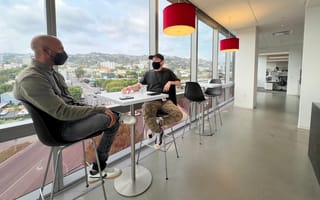Earlier this year, Built In examined the tech industry’s most coveted perks and uncovered how much has changed in the way job seekers perceive benefits packages in the wake of the Covid-19 pandemic. The big takeaway: Companies are making a lot of changes, and quickly. But how do you know what will stick?
“With so many options out there, companies can struggle to choose the right benefits for their employees,” said Shannon Sullivan, chief people officer at banking app Dave. “It can also be very tempting to adopt the latest fads.”
In order to make the right changes, Sullivan relies on two key sources. First, she and her team regularly check in with employees about their wants and needs. Second, she noted that Dave has established guiding principles “that serve as a communication tool to show employees what the company is investing in and why.”
BANKING WITH PURPOSE
For Sullivan, combining these two tools enables the organization to meet team members’ individual needs and goals, while remaining committed to Dave’s mission and values.
Yet that’s far from the only way the organization is stepping up its efforts to support employees. Built In LA caught up with Sullivan to gain her perspective on the shifting HR landscape and how the company has transformed both its benefits and working environment.

How did the pandemic change the work of human resources and talent management?
When Covid-19 took hold, my team’s work and priorities practically changed overnight. The pandemic put the future of work at the forefront, as we were all forced to adapt to changing external realities and employee expectations. While that adjustment has been stressful, it has been a tremendous learning experience and widened my perspective regarding how work gets done. The pandemic also forced HR professionals to become crisis management experts. While this was always part of my job, it previously made up a smaller portion of my daily role. The past two years have been a crash course in persevering through change and leading with empathy.
What kind of feedback did you get from employees early in the pandemic, and how has that changed with restrictions easing?
At the beginning of the pandemic, there was general excitement, considering most people were eager to work from home. Yet that dissipated relatively quickly, as team members started to miss in-person connections, and new hires found remote onboarding rather challenging.
Earlier this year, we decided to adopt a virtual-first working model and committed to keeping a pulse on how this model is working for our team. Recently, I joined our executive vice president of engineering and led a listening session with employees to gauge how the virtual-first environment has worked for them. We found that this new model has transformed employees’ lives, enabling them to build the professional and personal lives they want without trade-offs. While many team members have benefited from the transition, they still miss the higher level of connection and collaboration that comes with in-person work. With restrictions easing, we’ve opened our Los Angeles office for those who want to come in. More teams are gathering in person on an ad-hoc basis, and we’re considering coworking solutions to provide employees with more options.
PRIORITIZING INCLUSION
How has your company’s benefits package changed recently, and do you expect to make adjustments in the near future?
This year, we implemented guiding principles for our benefits and well-being resources in order to ground our decisions and investments for the future. We are committed to offering meaningful benefits for all employees, as we hire people from all walks of life with unique needs. In support of this principle, we implemented parental and family care leave for all team members. Both options offer twelve weeks of paid time off. Additionally, birth givers receive the standard leave provided by their home state.
We strive to offer benefits that align with Dave’s mission, values, goals and people priorities. This year, we announced that all employees would have access to a dedicated financial advisor through Northstar. This benefit aligns with our mission and represents our commitment to our team’s financial wellness. More than 60 percent of employees are currently working with a financial advisor through this program.

Do you see less traditional perks as part of the overall benefits discussion or as part of the company’s culture and general values?
We treat employee support as part of our people strategy and culture as opposed to a company perk. For employees to feel supported, they must have a productive and trusting relationship with their manager. That’s why we spent significant time defining our leaders’ expectations, which we call our “people leader commitments.” These are intended to hold our leaders accountable for building highly engaged, high-performing teams. In our most recent engagement pulse survey, we found that 90 percent of employees believe their manager genuinely cares about their well-being, while 85 percent reported their manager keeps them informed about what’s happening at the company.










